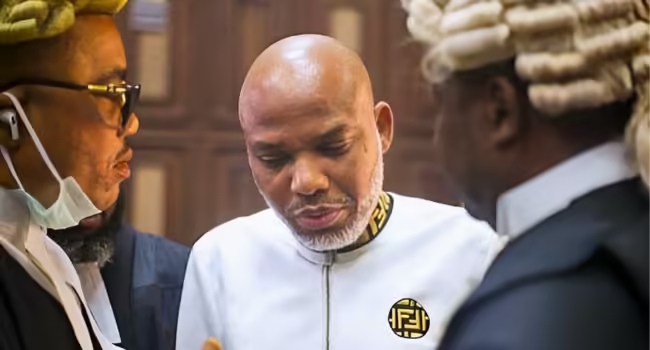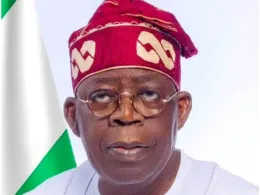Nnamdi Kanu, through the suit, asked the court to determine whether his forcible abduction and return to Nigeria violated various provisions of the African Charter on Human and Peoples’ Rights as well as Nigeria’s Extradition Act.
Abuja, Nigeria – The Federal High Court in Abuja has dismissed a N50 billion fundamental rights enforcement suit filed by the detained leader of the Indigenous People of Biafra (IPOB), Nnamdi Kanu, against the Federal Government, citing lack of diligent prosecution.
Justice Inyang Ekwo, in a ruling delivered on Thursday, noted the repeated absence of legal representation for Kanu, which led to multiple adjournments. The judge observed that while the Federal Government was represented by a counsel during the previous hearing, neither Kanu nor his legal team were present in court during Thursday’s proceedings. As a result, the court had no option but to strike out the case.
The suit, marked FHC/ABJ/CS/462/2022, was filed by Kanu against the Federal Republic of Nigeria and the Attorney-General of the Federation (AGF), alleging grave violations of his fundamental rights following his extraordinary rendition from Kenya in 2021.
Kanu, through the suit, asked the court to determine whether his forcible abduction and return to Nigeria violated various provisions of the African Charter on Human and Peoples’ Rights as well as Nigeria’s Extradition Act.
Among the reliefs sought were a declaration that his rendition was unlawful, an immediate release from the custody of the Department of State Services (DSS), and a restraining order against further prosecution based on a 15-count amended charge pending before another Federal High Court presided over by Justice Binta Nyako. He also demanded N100 million in legal costs and N50 billion in general damages.
However, the Federal Government, through a preliminary objection filed in June 2022, urged the court to dismiss the suit, describing it as a duplication of an earlier case filed by Kanu at the Federal High Court in Umuahia, Abia State. The government argued that both cases shared similar facts and involved the same parties, thus rendering the Abuja suit an abuse of court process.
Meanwhile, the internal legal wrangling within Kanu’s team may have also contributed to the delays in the suit’s prosecution. At a previous sitting, counsel Aloy Ejimakor informed the court of a notice of change of counsel, taking over the case from senior advocate, Chief Mike Ozekhome (SAN), who initially filed the suit in April 2022.
The court’s decision comes amid renewed concerns raised by Kanu over what he described as a pattern of executive interference and judicial irregularities in the handling of his case. In an open letter made public earlier this week, Kanu accused the federal government of deploying “executive and judicial fraud” to suppress his quest for justice since his rendition.
He referenced past court rulings which, according to him, condemned the actions of the federal government, including a 2017 judgment that affirmed IPOB’s legality and another that declared his rendition and detention unconstitutional.
Kanu also expressed frustration with the judicial process, accusing the courts of bias and selective justice. He claimed that a judge who had recused herself from his trial was re-assigned the case, a move he alleged was orchestrated in collaboration with the Chief Judge of the Federal High Court and federal authorities.
Despite these developments, Kanu reiterated his refusal to submit to any trial he believes does not meet constitutional standards, even if it means remaining in custody indefinitely.
As the legal tussle continues, attention now shifts to how the Federal High Court will handle the core criminal trial referred back by the Supreme Court, and whether Kanu’s rights claims will eventually receive substantive judicial attention.










Join our Channel...